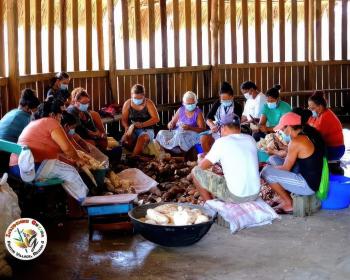The status of the Upper Mazaruni Hydro-electric project is still unknown. If completed, this project could lead to the relocation of some 4000 Indians in Guyana's Rupinuni region.
There are four reasons why the project is in question. The World Bank has commissioned an independent study of the hydro-electric potential of various sites in Guyana. The findings from this report will be available by July, 1982. Bank sources express doubt that the Upper Mazaruni site at Sand Landing will be ranked first. If it is, however, the World Bank would attempt to fund the project.
A related problem is the Bank's insistence that Guyana locate private funding for an aluminum smelter, an associated project that provides the rationale for the hydro-electric scheme. The smelter would be expected to use much of the energy generated at the dam. But, due to Guyana's nationalization of foreign-owned industries in the past, and the country's current dire financial condition, it is doubtful that funding for the smelter will be located.
Another problem associated with any development in western Guyana stems from a long-standing boundary dispute. Venezuela currently claims more than 60 percent of Guyana's total territory. In 1899, a five-member arbitration panel handed down a decision which, in general, favored Britain, although Venezuela received some 5000 square miles and control of the Orinoco River. In 1962, Venezuela declared this agreement null and void, and reopened negotiations, first with Britain and then, after Independence, with Guyana. In 1970, a protocol was agreed to by both parties which tabled the issue until 1982. Venezuela has recently informed Guyana that it will not resume the protocol when it expires on 17 June.
Finally, the international aluminum market is depressed at the moment. If the price recovers then that would provide more incentive for the Upper Mazaruni project.
By comparison, Surinam has abandoned the vast Kabelebo Dam Project, citing territorial disputes with Guyana and the depressed aluminum market. Instead they have decided on a small hydro-electric project without an associated smelter.
As long as the Upper Mazaruni area is in dispute, it is unlikely that the World Bank or a private consortium will invest in the hydro-electric dam and the associated smelter project. This summer, the Bank's financial evaluation of the potential sites will be available and the negotiations between Venezuela and Guyana will begin. The coming years will be important for the Akawaio.
Article copyright Cultural Survival, Inc.

